Blog
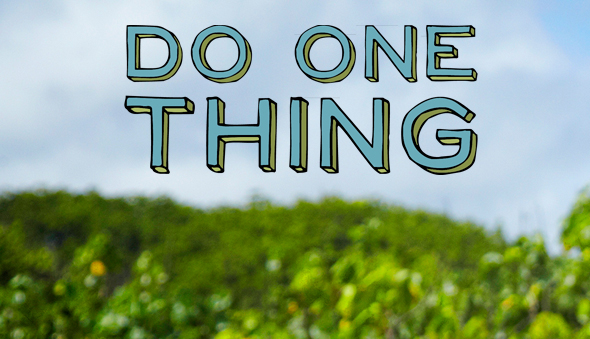 Love the beach? Prolonged sun exposure—as well as hormonal changes, especially in women—can lead to hyperpigmentation, in which some patches of skin are darker than others. Many dermatologists will prescribe products that contain the ingredient hydroquinone to address this condition. However, you should know that the EPA considers hydroquinone a “skin irritant”, and scientists have linked it to skin cancer. It also has the unfortunate side effect of making the skin hypersensitive to the sun. Ah, the irony.
Love the beach? Prolonged sun exposure—as well as hormonal changes, especially in women—can lead to hyperpigmentation, in which some patches of skin are darker than others. Many dermatologists will prescribe products that contain the ingredient hydroquinone to address this condition. However, you should know that the EPA considers hydroquinone a “skin irritant”, and scientists have linked it to skin cancer. It also has the unfortunate side effect of making the skin hypersensitive to the sun. Ah, the irony.
A better bet is slow-but-sure natural exfoliation. Look for beauty products that contain botanically derived lightening agents like lemon peel and licorice extract, which reduce hyper-pigmentation by inhibiting the enzyme that makes the skin overproduce the pigment in the first place. Or try this DIY remedy: After cleansing, cut a lemon in half and rub it on the area, being careful to avoid the eye area. Leave the juice on for up to 10 minutes—the slight stinging indicates the fruit acids are doing their exfoliating work—and rinse. Then follow with a soothing and hydrating mask of raw, natural honey.
And the next time you hit the waves, wear zinc-based sunscreen—and a hat!
Jul 07, 2014 | Categories: Sustainability | Tags: beauty, burn, hydroquinone, hyperpigmentation, melanoma, skin, sun exposure, sun spots, tan | Comments Off on Spot Treat
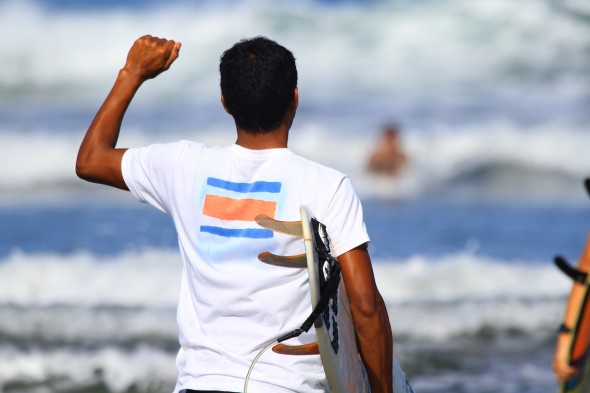
Pre-paddle-out pride! Soccer and Surfing, only two of Costa Rica’s many passions…
We are all thrilled by the National Team’s World Cup tenacity and achievement…
See you Saturday for peak swell and futbol!
photo provided by Surfing Nosara
Jul 03, 2014 | Categories: Costa Rica, Creative Culture, Harmony Hotel, Nosara, Surfing | Comments Off on Guiones Surf Photo of the Week
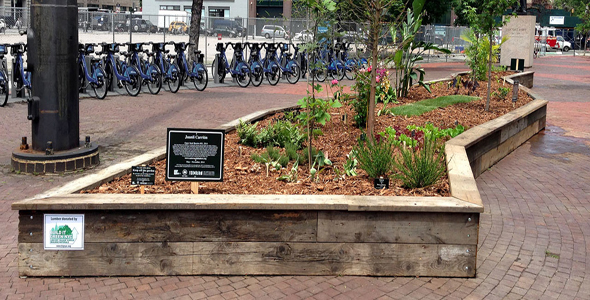
This past January I had the opportunity to speak with artist Juanli Carrión about his recent project, Outer Seed Shadow #01. (Check out our interview here.) He described to me that Outer Seed Shadow #01 was to be a Manhattan-shaped community garden, where native plants from various countries could represent the rich diversity of the New Yorkers living in those neighborhoods. Carrión also planned to use the garden as an opportunity to interview those involved about their immigration experience, by creating a safe and nurturing space where these conversations are encouraged.
Six months later, Outer Seed Shadow #01 has become a gorgeous reality. Outside of the modern design and experience of coming upon a beautiful public garden in the heart of a city, the project has already accomplished exactly what it was meant to achieve, and more. Twenty four plants from twenty four countries have been planted, and you can watch interviews with the individuals who chose them. Get involved by becoming an interviewee, attending the public programs, donating to the garden, or sharing the story of this wonderful project.
Like the OSS#1 Facebook Page for event updates and photos.
Outer Seed Shadow #01
Duarte Square
New York City, New York
*For those who are curious about Costa Rica, the chosen plant was a snapdragon.
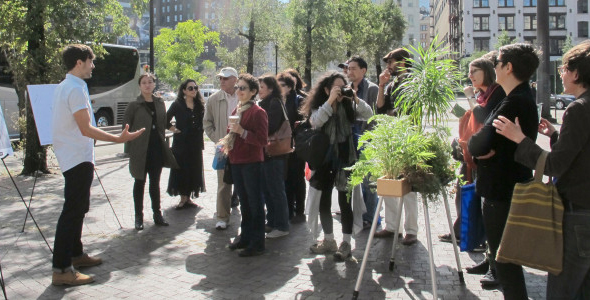
Artist Juan Carrion speaking to a group of visitors at the garden.
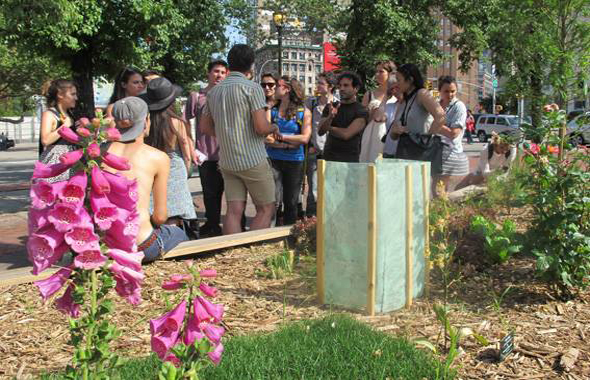
School of Visual Arts visiting OSS#1
Jul 02, 2014 | Categories: Creative Culture, New York City, Sustainability, Travel | Comments Off on Outer Seed Shadow #01
 Eliminating pesticides probably easier than you think—try these three simple tactics.
Eliminating pesticides probably easier than you think—try these three simple tactics.
First, since 80% of our exposure comes from pest-killing chemicals, according to the EPA, get all skull-and-crossbones labeled poisons for ants, flies, roaches or weeds out of your cupboards. Try pesticide-free natural remedies like red pepper for ants, white wine and dish soap for fruit flies, keeping crumbs off of counters, pouring boiling water over weeds. These things really work!
Second, according to the Environmental Working Group, you can lower your exposure by 90 per cent simply by avoiding the most contaminated conventionally grown produce. Check the Shopper’s Guide to Pesticides in Produce for the latest list—you might be surprised to find commonly found fruits like apples at the top.
Finally, avoid those antibacterial soaps, which depend on pesticides like triclosan to kill germs. Warm water and soap works just as well or better, studies show.
Jun 30, 2014 | Categories: Sustainability | Tags: pesticides, pests | Comments Off on Nix Pesticides
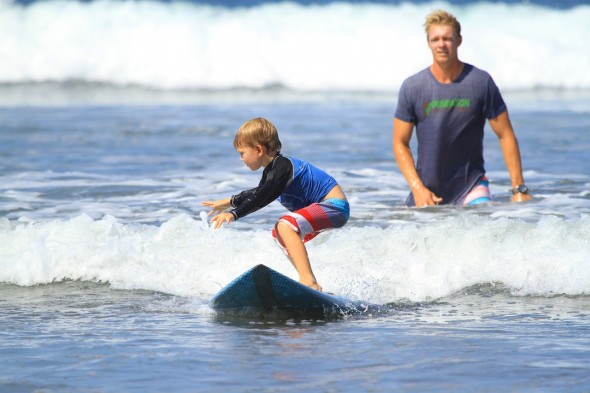
The World’s Children will hold the future of the Earth and her Oceans in their hands. Beyond the thrill and the majesty of Surfing must lie a deep respect for, and a responsibility to, the Ecosystem that continually accommodates it.
Surfing Stewardship. Suddenly, clean water, abundant marine life, coastal habitat, and human impact acquire greater meaning. It all begins with just one ride!
photo provided by Surfing Nosara
Jun 27, 2014 | Categories: Costa Rica, Creative Culture, Harmony Hotel, Nosara, Surfing | Comments Off on Guiones Surf Photo of the Week
 Where can you find the most toxic non-radioactive element on Earth? In your sushi. Here’s why: Coal-powered electricity plants release mercury into our rivers and oceans where fish live; then we eat the fish. During the two-to-three month period that mercury stays in our bodies it can affect sensory perception, memory and motor skills. High levels of mercury can damage the brain, heart, kidney, lungs and immune system. Serious mercury poisoning can result in mental retardation, cerebral palsy and dementia. Kinda makes you want to rethink that yellowtail, doesn’t it? According to the EPA, all fish now contain mercury, but these contain the highest concentrations: tuna, shark, swordfish, mackerel and tilefish. Lowest? Shrimp, salmon, pollock and catfish. Download the Seafood Watch guide to get the latest.
Where can you find the most toxic non-radioactive element on Earth? In your sushi. Here’s why: Coal-powered electricity plants release mercury into our rivers and oceans where fish live; then we eat the fish. During the two-to-three month period that mercury stays in our bodies it can affect sensory perception, memory and motor skills. High levels of mercury can damage the brain, heart, kidney, lungs and immune system. Serious mercury poisoning can result in mental retardation, cerebral palsy and dementia. Kinda makes you want to rethink that yellowtail, doesn’t it? According to the EPA, all fish now contain mercury, but these contain the highest concentrations: tuna, shark, swordfish, mackerel and tilefish. Lowest? Shrimp, salmon, pollock and catfish. Download the Seafood Watch guide to get the latest.
Jun 23, 2014 | Categories: Sustainability | Tags: fish, mercury, pescatarian, vegan, vegetarian | Comments Off on Mind Your Mercury

Grey on Gray summer morning. Except for the white jagged lightning line of this speed surfer’s round house cutback. Even in the mist and the light rain, it shines. Precision turn and tight radius in a limited space.
photo provided by Surfing Nosara
Jun 20, 2014 | Categories: Costa Rica, Creative Culture, Harmony Hotel, Nosara, Surfing | Comments Off on Guiones Surf Photo of the Week
 Meat might be fine in moderation, but the all-American diet of meat once—or even three times—a day is probably not the best thing for anyone. A full 37% of human-induced methane emissions come from livestock! And unfortunately, even organic, free-range can’t protect you from some problematic industrial chemicals found in meat, which accumulate in animal fat, transfer to our bodies when we eat it, and can even be passed on to our children when we’re pregnant. If you do eat meat, search out low-fat meats, and reduce the fat content by trimming it away before cooking.
Meat might be fine in moderation, but the all-American diet of meat once—or even three times—a day is probably not the best thing for anyone. A full 37% of human-induced methane emissions come from livestock! And unfortunately, even organic, free-range can’t protect you from some problematic industrial chemicals found in meat, which accumulate in animal fat, transfer to our bodies when we eat it, and can even be passed on to our children when we’re pregnant. If you do eat meat, search out low-fat meats, and reduce the fat content by trimming it away before cooking.
Jun 16, 2014 | Categories: Sustainability | Tags: dioxin, flexitarian, meat, vegan, vegetarian | Comments Off on Eat Less American
 Love the beach? Prolonged sun exposure—as well as hormonal changes, especially in women—can lead to hyperpigmentation, in which some patches of skin are darker than others. Many dermatologists will prescribe products that contain the ingredient hydroquinone to address this condition. However, you should know that the EPA considers hydroquinone a “skin irritant”, and scientists have linked it to skin cancer. It also has the unfortunate side effect of making the skin hypersensitive to the sun. Ah, the irony.
Love the beach? Prolonged sun exposure—as well as hormonal changes, especially in women—can lead to hyperpigmentation, in which some patches of skin are darker than others. Many dermatologists will prescribe products that contain the ingredient hydroquinone to address this condition. However, you should know that the EPA considers hydroquinone a “skin irritant”, and scientists have linked it to skin cancer. It also has the unfortunate side effect of making the skin hypersensitive to the sun. Ah, the irony.









